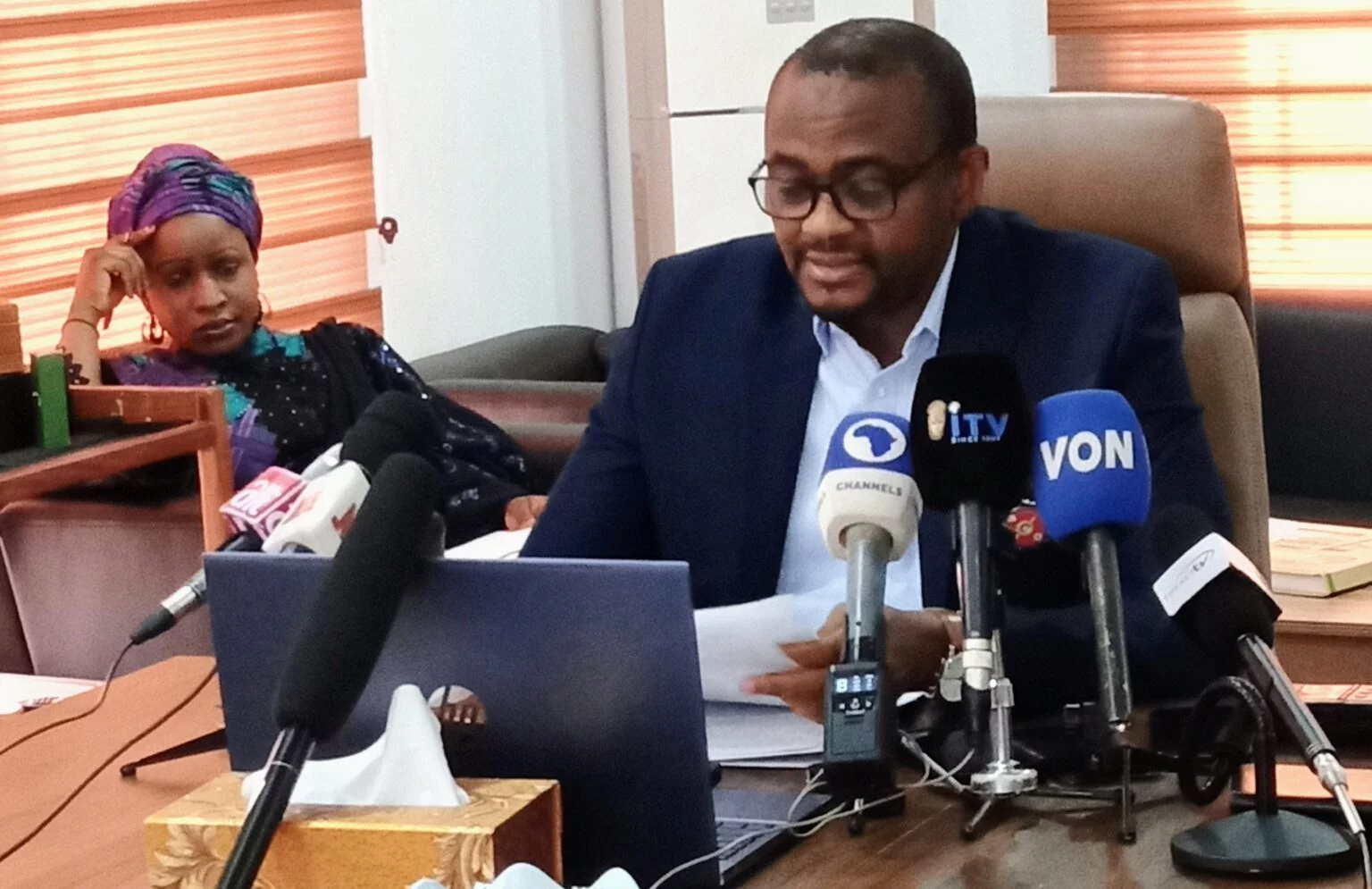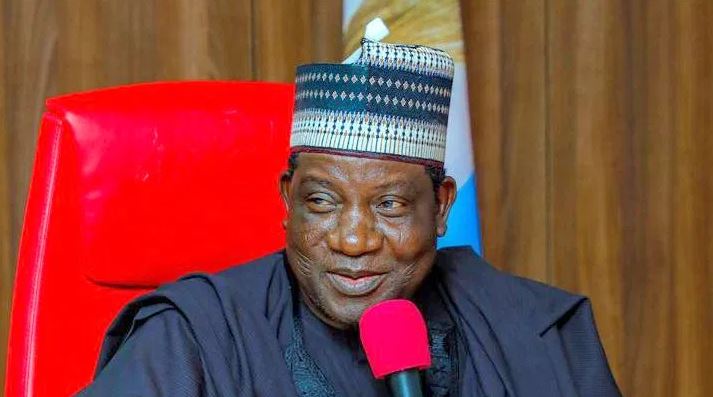economy
Nigeria Can’t be Surviving on Debt at 63rd Independence Anniversary- Deputy Speaker

The Deputy Speaker of the House of Representatives, Benjamin Kalu, has expressed concern about Nigeria’s reliance on debt at 63 years of Independence anniverary.
Speaking at a stakeholders’ dialogue on the implementation of Section 45 of the Fiscal Responsibility Act, on Saturday in Lagos, Kalu said the nation needs to be self-sufficient and independent instead of relying on loans.
Kalu, represented by Mr Nalaraba Abubakar, Chairman, House Committee on Loans and Debt Management, said previous governments sustained budgets through loans but an approach he considered not sustainable.
He also said that the compliance of the provisions of Section 45 of the FRA remains crucial to the banks and other financial institutions before lending to any government of the federation.
“Lending by banks and financial institutions is contravention to the FRA 2007 is unlawful,” the lawmaker said.
Kalu said it was imperative for banks and financial institutions to comply with the provisions outlined in Section 45 of the Fiscal Responsibility Act before they lend to the government.
He noted that it was essential to consider the authorised borrowing limit specified in the appropriation Act and adhere to the extant provisions of Section 45.
The deputy speaker expressed his disappointment that state governments were borrowing for consumption rather than focusing on long-term capital expenditure for production purposes.
According to him, the trend worsens the country’s inflation and inhibits economic growth.
Kalu urged state governments to explore their own potentials and enhance local production to increase internally generated revenue instead of relying solely on the Federal Government.
“We encourage states to stop depending on federal government and boost their local production, thereby increasing internally generated revenue.
“I commend FRC in its responsibility of keeping up with promoting a transparent and accountable government fiscal management framework for Nigeria,” the deputy speaker said.
He, however, expressed disappointment that the authorities in charge of monitoring inflow of grants into the country had no proper record of the grants.
“These grants do not just pass through the thin air, but by processes, which the commercial banks are involved in.
“It is important for commercial banks to liaise with the government by making disclosure on the inflow of the grants,” he said.
According to him, accumulation of those aids and grants are crippling the economy, which has become unbearable.
Kalu confirmed that the 10th Assembly wasprepared to introduce legislation that would bring transparency to the processes of grants entering the country.
He said it also plans to enact a law compelling commercial banks to disclose the sources of grants, their beneficiaries, and who holds custody of the funds.
He noted that these measures aim to provide greater oversight and accountability in the management of grants in the country.
The lawmaker said: “We have billions of dollars coming into Nigeria as grants, but cannot pin point where the grants are going into in the economy.
“So, it’s important that the commercial work together with the government to rebuild the country, because a bouyant economy would also contribute in the activities of the banks too.” (NAN)
economy
China plans Increased Imports in 2024

China plans to increase imports this year to share the business opportunities arising from its ultra-large market with the world, Commerce Minister Wang Wentao said on Friday.
Wang in a press conference said that China would expand the imports of high-quality consumer goods, advanced technologies, important equipment, key components, energy and other resources, and agricultural products in short supply in the country.
According to him, China will move to diversify import channels and streamline the process of importing.
”The country will continue to host the China Import and Export Fair, the China International Fair for Trade in Services and the China International Import Expo, as well as support Chinese enterprises in attending exhibitions abroad.
”We will further facilitate cross-border trips for businesspeople to create opportunities for face-to-face communication”, he said.
Wang said that in April 2023, the State Council issued a guideline on stabilising the scale of foreign trade and optimising its structure, which had produced positive result.
”While continuing to ensure the implementation of the guideline, the Ministry of Commerce is now considering additional measures in this regard.
“It is also trying to roll them out as soon as possible to complement the existing policies, “Wang added. (Xinhua/NAN)
economy
FCT-IRS to Deploy Artificial Intelligence in Tax Collection, says Ag Chairman

The Federal Capital Territory Internal Revenue Service (FCT-IRS) is to deploy artificial intelligence to facilitate voluntary tax compliance in 2024.
The acting Executive Chairman of the service, Mr Haruna Abdullahi, made this known during the FCT-IRS end-of-year media briefing, in Abuja on Wednesday.
Abdullahi added that other technology solutions to be deployed include cloud computing, collaboration tools, business process automation and data analytical tools.
According to him, the goal is to improve performance of routine tasks, aimed at encouraging voluntary compliance and ease of doing business.
He explained that from inception, the emphasis has been on driving the Service using technology, adding that the Service has invested in modern working tools such as hardware and software.
“The Service will further employ the use of technology to enhance operations mainly in compliance, enforcement.
“We will also seek to consolidate the culture of transparency and accountability in order to build trust and cooperation between the service and the taxpayers.
“The processes of registration, payment, receipt, assessment, Tax Clearance Certificate (TCC) issuance, filing of returns, TCC verification, and generation of withholding tax credit notes have all been automated.
“Also, to encourage voluntary compliance and to allow taxpayers perform their tax obligations at the comfort of their homes or offices, the FCT-IRS introduced a Self-Service portal, www.fctirs.gov.ng.
“This enables taxpayers to request for Taxpayer Identification Number (TIN), file annual returns, make payment and request for TCC,” he said.
The acting chairman added that the Service would, in accordance with the tax laws, apply a penalty for non-filing of annual returns by January 31 of every year for employers and March 31 of every year for individuals.
According to him, part of the effort is to ensure compliance with filing of returns.
He added that a comprehensive reassessment of returns would be intensified, which would be followed by constant monitoring and compliance exercises.
He also said that to comply with the ease of doing business initiative, the Service would open more tax offices across the six Area Councils in FCT and at strategic locations.
This, he said, would ensure convenience of the taxpayers and further streamline services, making the tax offices accessible to a broader population and contributing to overall organisational growth.
“Additionally, a state of the art headquarters will be constructed, not only to provide for coordination of operations but also reflect our commitment to excellence.
“To attract and retain young talents, the Service will embark on providing targeted training programmes towards ensuring employees stay updated with industry trends.
“We will also be providing staff with modern working tools to foster efficiency and innovation,” he said.
Abdullahi disclosed that from January 2024, the Service would embark on intensive enforcement exercise in line with the provisions of extant laws.
He added that the Service would not only hesitate to prosecute tax offenders through the instrumentality of the law but would ensure that all tax due to FCT were recovered. (NAN)
COVER
Strike: FG Okays 30 Days Implementation of MoU with Labour

The Federal Executive Council, FEC, on Wednesday approved a 30 day implementation plan for the Memorandum of Understanding, MoU between the Federal Government and the Organized Labour.
The government also is taking a decision against any external interference in unions activities by external bodies.
This is as the Minister of Labour and Employment, Simon Lalong alongside the Minister of State, Nkeiruka Onyejeocha have met with the factional leaderships of the National Union of Road Transport Workers, NURTW.
Briefing State House correspondents at the end of the Federal Executive Council, FEC, presided over by President Bola Tinubu, at the Council Chamber, Presidential Villa, Abuja, Lalong said a Memorandum was presented to the council on the implementation of the agreement with labour.
He said, “We presented a memo from the Federal Ministry of Labour and Employment and the memo was basically on the agreement between government and the labour. You are already aware that 15 items are parts of the agreement.
“But we went beyond mere agreement, we told them that something different this time is happening because one, part of the agreement is to file it in the court of law which we have set the process already.
“And the other one was the presidential approval. There cannot be any presidential approval more than the Federal Executive Council. So we presented them to the Federal Executive Council. We analyzed each and every aspect of the agreement and to show the genuineness and also provide for harmonious and good industrial relationship and that was why it was presented and it was approved for implementation.
“It was agreed that within 30 days, there must be evidence of implementation and that was the basis of presenting to the Federal Executive Council the memo and the Federal Executive Council also approved it and within this 30 days, we will go on with the implementation of the agreement between labour and government.”
Fielding on the item six of the MoU which was the government alleged interference in the activities of the democratically elected leadership of the National Union of Road Transport Workers, NURTW and the mandate to him (Lalong) to resolve the crisis in the union on or before October 13, the Minister said he had already met with the various factions
He said, “Item six in the MoU is about interference specifically with issues that were about road transport workers. Immediately the next day, we embarked on meetings between the two organisations.
“As of today, they have already reached out and have concluded that of Road Transport Employers Association of Nigeria, RTEAN, today they are making a report to the ministry about their agreement because they went into agreement too and we are also going to get back to their parent association.
“The next one is the NURTW. Last week we were with them. Of course if some of you were there, you knew why we postponed it, I reminded them that we are keeping to the date of the agreement but they said they cannot strictly keep to the date because it is very important to them that we realized the aim. So we shifted the meeting till tomorrow. Today, we are going to get the report, by tomorrow we will fix a meeting.
“The reason why we presented these items to the Federal Executive Council is for them to note and approve that after these things we will not want to be tolerating interference into union activities.”But those that are pending are within the Federal Ministry of Labour and Employment. Our own is to dispense with conflicts and we are going to continue to do that and these two items we have mentioned, were really the particular things they hammered on when we met. By God’s grace in the next few days, those ones are going to be sorted out.”




















